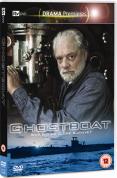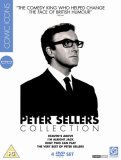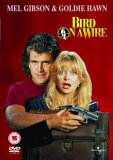![Black Beauty [1994]](/pictures/1010159.jpg) Black Beauty | DVD | (21/08/2000)
from £8.95
| Saving you £5.04 (56.31%)
| RRP
Black Beauty | DVD | (21/08/2000)
from £8.95
| Saving you £5.04 (56.31%)
| RRP When a girl is given the horse of her dreams the pair form a bond of love and trust that will last forever. Polly and her Black Beauty share wondrous adventures and face hardship and danger with brother Bertie Merry Legs the pony and the other residents of their lush country estate. All of the splendor and excitement of Anna Sewell's classic novel are thrilling to boys and girls.
![Zulu [1964]](/pictures/1002950.jpg) Zulu | DVD | (18/11/2002)
from £8.07
| Saving you £7.92 (98.14%)
| RRP
Zulu | DVD | (18/11/2002)
from £8.07
| Saving you £7.92 (98.14%)
| RRP One of the last of the classic-era widescreen epics, Zulu was also one of the last war movies to celebrate the virtues of the famous British stiff upper lip. At Rorke's Drift in 1879 a handful of British soldiers, hopelessly outnumbered by 4,000 Zulu warriors, fought one of the most celebrated defensive actions in military history. Zulu tells the story on an epic scale, bringing to life the heroism, courage, loyalty and sacrifice of those desperate hours. This is truly cast-of-thousands filmmaking, with vast action wonderfully captured in widescreen Technirama. John Barry, who also scored Goldfinger in the same year, provides a telling musical accompaniment. The superb cast includes Stanley Baker and Jack Hawkins, but Zulu's final claim to fame is that it made an instant international superstar of a young actor whose name is Michael Caine. A belated sequel arrived in 1979 in Zulu Dawn, which despite even more spectacular action and a great cast died at the box-office. It is nevertheless well worth seeing. On the DVD: Zulu on disc has excellent prologic stereo considering the age of the film, while the anamorphically enhanced 2.35:1 transfer is crystal-clear, boasting rich colours, strong contrast and detail and only occasional minor print flaws. The original American trailer, also presented anamorphically enhanced at 2.35:1, is a worthwhile addition. There is a very good new 45-minute "making of" (1.77:1 anamorphic, in stereo), curiously split into two parts. The heart of the programme consists of interviews with survivors from the film, focusing on Stanley Baker's widow. The only let down is lack of input from Michael Caine and composer John Barry. The commentary by film historian Sheldon Hall, author of a forthcoming book on the movie, and Second Unit Director Robert Porter is serious and packed with information. --Gary S Dalkin
![Absolute Beginners: 30th Anniversary Edition [DVD]](/pictures/1140327.jpg) Absolute Beginners: 30th Anniversary Edition | DVD | (25/07/2016)
from £N/A
| Saving you £N/A (N/A%)
| RRP
Absolute Beginners: 30th Anniversary Edition | DVD | (25/07/2016)
from £N/A
| Saving you £N/A (N/A%)
| RRP Set against a backdrop of emerging teen culture and rising racial tension in late 50's London, Colin MacInnes' cult novel is brought to the screen in Julien Temple's lavish musical adaption. Struggling young photographer Colin sees his ambitious, fame-seeking girlfriend Crepe Suzette slipping away as she ruthlessly pursues a career in fashion. To win her back he'll need to compromise his idealism and do whatever it takes to make the big time himself.
![Elseworlds: Part 1-3 [DVD] [2019]](/pictures/1150457.jpg) Elseworlds: Part 1-3 | DVD | (26/08/2019)
from £6.99
| Saving you £N/A (N/A%)
| RRP
Elseworlds: Part 1-3 | DVD | (26/08/2019)
from £6.99
| Saving you £N/A (N/A%)
| RRP NOTICE: Polish Release, cover may contain Polish text/markings. The disk has English audio.
![Treasure Island [1950]](/pictures/1010052.jpg) Treasure Island | DVD | (12/02/2001)
from £8.25
| Saving you £7.74 (93.82%)
| RRP
Treasure Island | DVD | (12/02/2001)
from £8.25
| Saving you £7.74 (93.82%)
| RRP Strap on your pantaloons and prepare to travel with Jim Hawkins and Blind Pew to one of the most famous fictional islands in history, Treasure Island. Walt Disney's 1950 adaptation of Robert Louis Stevenson's swashbuckling masterpiece has held up extremely well, with action and characterisations that feel freshly minted (although it's unlikely that the Mouse of today would sanction the high level of booze flowing throughout the picture). Great fun, with nary a wasted frame and, in the character of Robert Newton's much-imitated Long John, one of cinema's most boisterously crowd-pleasing villains ever. (Proving that you can't keep a good--er, bad man down, Newton would return with director Byron Haskins for the enjoyable sequel, Long John Silver.) Watching this classic is like having a flashback to some perfect Technicolor childhood. --Andrew Wright
 Ghostboat | DVD | (21/05/2007)
from £15.98
| Saving you £-5.99 (N/A%)
| RRP
Ghostboat | DVD | (21/05/2007)
from £15.98
| Saving you £-5.99 (N/A%)
| RRP 40 years after a British Sub goes missing at the end of the war it reappears and the British government send the remaining crew member with a new crew to trace the sub's last happenings. But the new crew start showing characteristics of the old crew...
![Mary Poppins Returns Doublepack [DVD] [2018]](/pictures/1148955.jpg) Mary Poppins Returns Doublepack | DVD | (15/04/2019)
from £7.94
| Saving you £N/A (N/A%)
| RRP
Mary Poppins Returns Doublepack | DVD | (15/04/2019)
from £7.94
| Saving you £N/A (N/A%)
| RRP In Depression-era London, a now-grown Jane and Michael Banks, along with Michael's three children, are visited by the enigmatic Mary Poppins following a personal loss. Through her unique magical skills, and with the aid of her friend Jack, she helps the family rediscover the joy and wonder missing in their lives.
![The Singing Detective [1986]](/pictures/1018351.jpg) The Singing Detective | DVD | (08/03/2004)
from £N/A
| Saving you £N/A (N/A%)
| RRP
The Singing Detective | DVD | (08/03/2004)
from £N/A
| Saving you £N/A (N/A%)
| RRP The late Dennis Potter was a master at mining the popular songs of the 1930s and '40s for dramatic effect, but he never did it better than in The Singing Detective. The inestimable Michael Gambon plays a mystery writer named Philip E Marlow, who is suffering a torturous bout of psoriatic arthritis in hospital, where he is a victim of both his disease and the National Health Service. Unable to move without pain, he escapes into his imagination, plotting out a murder tale in which he is both a big-band singer and a private eye. But Potter and director Jon Amiel also mix in flashbacks of Marlow's youth and his unhappy marriage to explain how the real Marlow reached this sorry pass. Flawlessly, intricately, kaleidoscopically assembled, the six one-hour episodes fly by like some fantastic fever dream. Marshall Fine
![The Amazing Mr Blunden [1972]](/pictures/1009189.jpg) The Amazing Mr Blunden | DVD | (24/02/2003)
from £27.88
| Saving you £-10.89 (N/A%)
| RRP
The Amazing Mr Blunden | DVD | (24/02/2003)
from £27.88
| Saving you £-10.89 (N/A%)
| RRP A mysterious very old solicitor Mr. Blunden (Naismith) visits Mrs. Allen and her young children in her squalid Camden Town flat and makes her an offer she cannot refuse. The family become the housekeepers to a derelict country mansion in the charge of the solicitor. One day the children meet the spirits of two other children who died in the mansion nearly a hundred years previously and start to look into the mystery surrounding a fire that destroyed the house and claimed the lives of the two children...
![The Shrink Is In [2000]](/pictures/1015973.jpg) The Shrink Is In | DVD | (22/10/2001)
from £2.75
| Saving you £17.24 (626.91%)
| RRP
The Shrink Is In | DVD | (22/10/2001)
from £2.75
| Saving you £17.24 (626.91%)
| RRP Falling in love can drive you crazy... Samantha suffers from many complex phobias. When her shrink is taken away Samantha grabs the oppurtunity to impersonate her doctor and hopefully win over the man of her dreams...
 Peter Sellers Collection | DVD | (16/10/2006)
from £17.97
| Saving you £12.02 (66.89%)
| RRP
Peter Sellers Collection | DVD | (16/10/2006)
from £17.97
| Saving you £12.02 (66.89%)
| RRP Featuring a collection of Peter Sellers' best films. Includes: 1. Heavens Above! (Dir. John Boulting & Roy Boulting 1963) 2. I'm Alright Jack (Dir. John Boulting 1959) 3. Only Two Can Play (Dir. Sidney Gilliat 1962) 4. Very Best Of Peter Sellers
 Diana - Her True Story | DVD | (18/08/2008)
from £7.24
| Saving you £-1.25 (N/A%)
| RRP
Diana - Her True Story | DVD | (18/08/2008)
from £7.24
| Saving you £-1.25 (N/A%)
| RRP Based on Andrew Morton's bestselling book the film traces Diana's transformation from shy young girl to public icon and sophisticated princess whose fairy tale marriage to Prince Charles soon turned into a nightmare well hidden outside the walls of Buckingham Palace. Until the book and this film revealed Diana's side of the story: her marital troubles her loneliness inside the royal family her suicide attempts and her struggles with bulimia. With this critically acclaimed film the world reached a new understanding of this complex fascinating woman.
![Phantom of the Open [Blu-ray] [2022] [Region Free]](/pictures/1159077.jpg) Phantom of the Open | Blu Ray | (25/07/2022)
from £10.35
| Saving you £N/A (N/A%)
| RRP
Phantom of the Open | Blu Ray | (25/07/2022)
from £10.35
| Saving you £N/A (N/A%)
| RRP The Phantom of the Open tells the remarkable true story of Maurice Flitcroft, a crane operator and optimistic dreamer from Barrow-in-Furness who, with the support of his family and friends, managed to gain entry to the 1976 British Open qualifying, despite never playing a round of golf before. With pluckiness and unwavering self-belief, Maurice pulls off a series of stunning, hilarious and heartwarming attempts to compete at the highest level of professional golf, drawing the ire of the golfing elite but becoming a British folk hero in the process.
 Bird On A Wire | DVD | (08/03/2004)
from £9.59
| Saving you £0.40 (4.17%)
| RRP
Bird On A Wire | DVD | (08/03/2004)
from £9.59
| Saving you £0.40 (4.17%)
| RRP This action-comedy from 1990 makes the critical mistake of trying to mix a potentially suspenseful plot with the kind of humour that Mel Gibson can only get away with in his Lethal Weapon movies. It doesn't work here because the movie's supposed to be a Hitchcockian thriller and Mel's wisecracking--not to mention some implausible plot twists and ridiculous chase scenes--makes it impossible to take any of this movie seriously. It works best as a lightweight vehicle for Gibson and Goldie Hawn, who bring their own established appeal to their roles as old lovers who are reunited under unexpectedly dangerous circumstances. After testifying against some drug-running killers, Mel's been safe under the protection of the FBI's witness relocation program, and Goldie coincidentally enters his life again just as the bad guys are hot on Mel's trail. They join up and go on the run from the villains and ... well, let's just say director John Badham doesn't have any big surprises up his sleeve. Goldie and Mel are enjoyable, as always, but you'd have to be their biggest fan to watch this movie more than once. --Jeff Shannon, Amazon.com
 JASON STATHAM - ACTION HEROES | DVD | (01/01/2023)
from £25.25
| Saving you £N/A (N/A%)
| RRP
JASON STATHAM - ACTION HEROES | DVD | (01/01/2023)
from £25.25
| Saving you £N/A (N/A%)
| RRP ![Simon Schama - A History of Britain : The Complete Series [2000]](/pictures/1032498.jpg) Simon Schama - A History of Britain : The Complete Series | DVD | (18/11/2002)
from £59.99
| Saving you £N/A (N/A%)
| RRP
Simon Schama - A History of Britain : The Complete Series | DVD | (18/11/2002)
from £59.99
| Saving you £N/A (N/A%)
| RRP Stretching from the Stone Age to the year 2000, Simon Schama's Complete History of Britain does not pretend to be a definitive chronicle of the turbulent events which buffeted and shaped the British Isles. What Schama does do, however, is tell the story in vivid and gripping narrative terms, free of the fustiness of traditional academe, personalising key historical events by examining the major characters at the centre of them. Not all historians would approve of the history depicted here as shaped principally by the actions of great men and women rather than by more abstract developments, but Schama's way of telling it is a good deal more enthralling as a result. Schama successfully gives lie to the idea that the history of Britain has been moderate and temperate, passing down the generations as stately as a galleon, taking on board sensible ideas but steering clear of sillier, revolutionary ones. Nonsense. Schama retells British history the way it was--as bloody, convulsive, precarious, hot-blooded and several times within an inch of haring off onto an entirely different course. Schama seems almost to delight in the goriness of history. Themes returned to repeatedly include the wars between the Scots and the Irish and the Catholic/Protestant conflicts--only the Irish question remains unresolved by the new millennium. As Britain becomes a constitutional monarchy, Schama talks less of Kings and Queens but of poets and idea-makers like Orwell. Still, with his pungent, direct manner and against an evocative visual and aural backdrop, Schama makes history seem as though it happened yesterday, the bloodstains not yet dry. On the DVD: The Complete History of Britain extras are generously packaged on a separate disc and include the original score and a Simon Schama biography. There's an interesting "promotional message" to camera in which Schama explains the role of a cab driver, Wally, in inspiring the series, along with an interview with Mark Lawson in which Schama stresses the deliberate subjectivity of these programmes and an inaugural BBC History lecture in which he defends TV's ability to transpose history to camera. --David Stubbs
![Ravenous [1999]](/pictures/1022938.jpg) Ravenous | DVD | (22/10/2001)
from £10.29
| Saving you £2.70 (26.24%)
| RRP
Ravenous | DVD | (22/10/2001)
from £10.29
| Saving you £2.70 (26.24%)
| RRP In 1847, the United States was a land of pioneers, of gold-starved Americans making their way west.
![An American Werewolf in London : Two Disc 21st Anniversary Special Edition [1981]](/pictures/1022838.jpg) An American Werewolf in London : Two Disc 21st Anniversary Special Edition | DVD | (04/03/2002)
from £16.22
| Saving you £-6.23 (N/A%)
| RRP
An American Werewolf in London : Two Disc 21st Anniversary Special Edition | DVD | (04/03/2002)
from £16.22
| Saving you £-6.23 (N/A%)
| RRP With an ingenious script, engaging characters, nerve-shredding suspense, genuinely frightening set-pieces and laugh-out-loud funny bits An American Werewolf in London is a prime candidate for the finest horror-comedy ever made. Americans David (David Naughton) and Jack (Griffin Dunne) are backpacking in northern England when Jack is killed by a wild beast and David is bitten. Back in London David finds himself falling in love with a nurse, Alex (played with winning charm by Jenny Agutter), and turning into a werewolf. Adding to his problems, an increasingly decomposed Jack keeps coming back from the dead, and he is not a happy corpse. The Oscar winning make-up and transformation scenes still look good and rather than send itself up Werewolf plays its horror seriously, the laughs coming naturally from the surreal situation. Naughton is engagingly confused and disbelieving, desperately coping with the ever more nightmarish world, while Landis delivers one absolutely stunning dream sequence, an unbearably tense hunt on the London Underground and a breathtaking finale. Gory, erotic, shocking and romantic, this unforgettable horror classic has it all. Tom Holland's Fright Night (1985) remixed the formula with vampires, as did Landis himself in Innocent Blood (1992). A disappointing sequel, An American Werewolf in Paris, followed in 1997. --Gary S Dalkin
![Bird on a Wire [1990]](/pictures/1050633.jpg) Bird on a Wire | DVD | (10/04/2003)
from £6.19
| Saving you £-0.20 (N/A%)
| RRP
Bird on a Wire | DVD | (10/04/2003)
from £6.19
| Saving you £-0.20 (N/A%)
| RRP Mel Gibson and Goldie Hawn star in this action-packed comedy directed by John Badham about two old flames who meet by accident and are plunged into a cross-country run for their lives.
![Shakespeare: Richard II [David Tennant] [RSC] [Blu-ray] [2014]](/pictures/1133499.jpg) Shakespeare: Richard II | Blu Ray | (06/05/2014)
from £20.55
| Saving you £4.44 (21.61%)
| RRP
Shakespeare: Richard II | Blu Ray | (06/05/2014)
from £20.55
| Saving you £4.44 (21.61%)
| RRP Richard is King. A monarch ordained by God to lead his people. But he is also a man of very human weakness. A man whose vanity threatens to divide the great houses of England and drag his people into a dynastic civil war that will last 100 years. RSC Artistic Director Gregory Doran directs David Tennant in the title role of 'a definitive production of great play' ( Daily Mail ).

Please wait. Loading...
This site uses cookies.
More details in our privacy policy